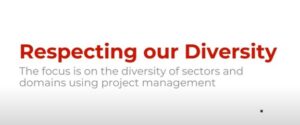Respecting Our Diversity | Project Management Levels
In our third episode of The 4PM Podcast, we discussed respecting our diversity and project management levels. The discussion is necessary to understand how individuals and organizations manage projects before they embark on a transformation journey.
Understanding diversity in project management
 We started by exploring the importance of project owners, providers, and customers in project management. Diversity, in this context, is not just about cultural or gender diversity, but it also encompasses the varying roles of project owners, service providers, and customers. We discussed the differences between project owners, service providers, and customers. Leading to a specific definition of “respecting our diversity.”
We started by exploring the importance of project owners, providers, and customers in project management. Diversity, in this context, is not just about cultural or gender diversity, but it also encompasses the varying roles of project owners, service providers, and customers. We discussed the differences between project owners, service providers, and customers. Leading to a specific definition of “respecting our diversity.”
Clearly, corporate or organizational culture is diverse, so we can’t go with one sort of project management. The way we practice project management is entirely different from one domain to another, from one company to another, making it difficult to reach any consistent form of project management.
Managing projects within organizations
In the next part, we started the discussion by highlighting that managing a project is the core of organizational project management. The discussion further explored the differences between working the part of a project and managing the whole project. We shared examples associated with the role of the project owner (an organization concerned with a project’s outcome).
Project Management Levels
There are technically 6 levels. However, we only discussed the first five levels of project management. These levels range from task management to value delivery management.
Task Management
Task management is the first level.
It is typical for straightforward projects, where managing tasks is all we need.
Stage Management
The second level is called the stage management.
To manage a typical project stage, we can follow a set of processes similar to what PMI or ISO offer in what they call the process groups.
Technical Project Management
The third level is Technical Project Management.
This is a common approach in many organizations and is promoted by various associations and literature. Under this level, a project often starts with a charter and ends with an output.
Product Delivery Management
Level 4 is more than managing a stage or delivering an output.
At this level, the focus is to expand project management’s role into a project’s discovery phase. However, the project still ends with the delivery of an output.
Value Delivery Management
Finally, we explored value delivery. The foundation for this approach is the concept of Integrations to Deliver Value. In other words, the focus is on the value intended/expected from the projects. Therefore, this approach covers the project from product vision to reality = success!
A video on this subject
Closing Remarks on Respecting Our Diversity
Today, we discussed the concept of diversity and the five levels of project management.
Towards the end of the episode, we discussed the need for transformation in project management in the discussion about Level 4 (Product Delivery) and Level 5 (Value Delivery). We raised thought-provoking questions while highlighting two important aspects of transformation from the previous episode. That episode explored the questions about the current health of project management and was focused on improving the practice.
Here, we leave you with a point to ponder: if you agree that we need to transform, what should be the primary focus for the transformation?
You can access more content about project management by clicking on www.urukpm.com.
We wish you success today, tomorrow, and always!

